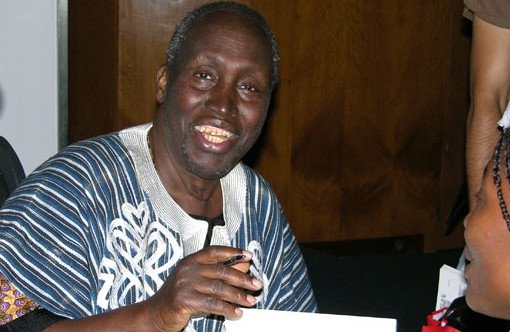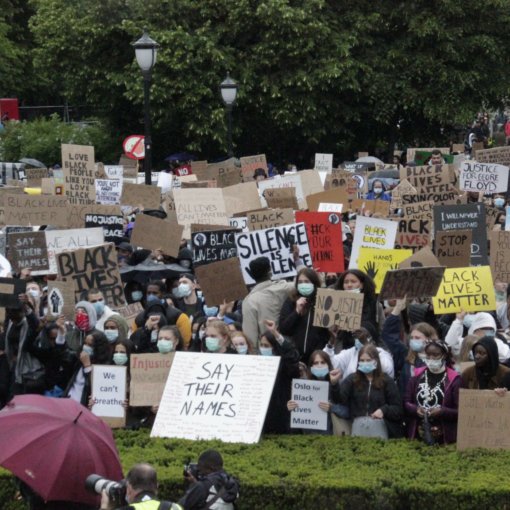In the Winter 2021 issue of the journal The Review of Higher Education (Johns Hopkins Univ Press) the Texas State University scholars Z.W. Taylor and Richard J. Reddick have published the article «The Eyes of History Are Upon You: Toward a Theory of Intellectual Reconstruction for Higher Education in a Post-Truth Era.» The paper covers a selection of theoretical models for a more inclusive Academy, one of them the article «Beyond decolonizing: global intellectual history and reconstruction of a comparative method by the historian of ideas Dag Herbjørnsrud (founder of SGOKI) in the journal Global intellectual History (May 2019) – alongside texts of John Dewey, WEB DU Bois, and Henry Louis Gates Jr.
Excerpt I (from «The Eyes of History Are Upon You»): «Ultimately, Herbjørnsrud’s (2019) call to move “beyond deconstruction and decolonization” (p. 20) and toward “a global comparative perspective” (p. 20) may be appropriate for intellectual reconstruction in higher education, given the globalization of higher education and the possibility that reconstruction both involves deconstruction and decolonization of institutional structures and inequitable power dynamics.»
Excerpt II: «Extending and synthesizing the work of Crozier (1901), Dewey (1920), W.E.B. Du Bois and Gates Jr. (2010), Hann and Hart (2011) and Herbjørnsrud (2019), the following section will forward a theory of intellectual reconstruction specifically for institutional leaders of higher education and their many educational stakeholders.» (…)
«At the center of the theory is Herbjørnsrud’s (2019) emphasis on adopting a global comparative perspective (…)»

The Review of Higher Education (published by Johns Hopkins University Press) is regarded as one of the world’s foremost research journals in the field (manuscript acceptance rate: ~5-7%), and it is the official journal of the Association for the Study of Higher Education.
On the authors of «The Eyes of History Are Upon You: Toward a Theory of Intellectual Reconstruction for Higher Education in a Post-Truth Era» (RHE: Vol. 44, No. 2. DOI: 10.1353/rhe.2020.0043): Richard J. Reddick is a Professor and Associate Dean for equity, community engagement, and outreach in the College of Education at The University of Texas at Austin, while Z.W. Taylor is an adjunct lecturer at the same university.
Extended excerpts from «The Eyes of History Are Upon You»:
From the Abstract: «This conceptual essay urges institutional leadership in higher education and academia writ large to practice intellectual reconstruction, or an education—not a celebration—of minoritizing institutional anachronisms in order to (re)purpose and (re)appropriate these anachronisms, many of which may be crucial to an institution’s identity, history, people, and place.»
From the Introduction: «As a result, this conceptual essay sets forth to address this tension and provide institutional leaders a theoretical framework of intellectual reconstruction to address institutional tradition and anachronism, such as “The Eyes of Texas.” Reimagining Crozier’s (1901) and Dewey’s (1920) notion of intellectual reconstruction, we repurpose the term intellectual reconstruction in the context of higher education for educating campus and community members about socially unjust institutional anachronism and balancing such anachronism with education, dialogue, and action. These institutional anachronisms include ambiguously racist institutional traditions such as “The Eyes of Texas,” as well as overtly racist installations on some college campuses, such as the erection—and removal—of Confederate statues glorifying individuals who supported slavery and violence against communities of Color (Crowe, 2018).
Instead of deconstructing pillars of a campus community and attempting to erase institutional tradition under the pressure of public sentiment or a select few individuals, intellectual reconstruction requires the effort and partnership of local historians, social justice advocates, and institutional leaders to educate campus communities and learn from past injustice, so this injustice is not perpetuated and celebrated.»
Excerpt, p. 176:
«Intellectual Reconstruction Through Global Perspectives
Finally, and addressing a global academic community, Herbjørnsrud (2019) argued that reconstruction of intellectual histories—primarily an interconnected global intellectual history—must move beyond past and present social contexts and cultural boundaries. Herbjørnsrud (2019) reasoned that disciplines such as history and anthropology must move beyond cultural boundaries and isolated ways of thinking, subsequently moving “beyond deconstruction and decolonization” (p. 20). As a result, Herbjørnsrud (2019) argued that by “giving priority to a reconstruction of new and more global narratives, which fit both the past and the future,” researchers and thought leaders have “the potential to reject the constrictions of cultural boundaries and instead demonstrate a commitment to a global comparative perspective” (p. 20).
As higher education has rapidly globalized in the past few decades (Altbach, 2016), institutional leaders of higher education could have their theory of intellectual reconstruction informed by Herbjørnsrud’s (2019) argument for an interconnected, global perspective of cultures, people, and their histories. Such a movement toward globalized perspectives also echoes Hann and Hart’s (2011) insistence that interdisciplinary academics collaborate to collectively perform intellectual reconstruction to promote a deeper understanding of human nature and social systems. Ultimately, Herbjørnsrud’s (2019) call to move “beyond deconstruction and decolonization” (p. 20) and toward “a global comparative perspective” (p. 20) may be appropriate for intellectual reconstruction in higher education, given the globalization of higher education and the possibility that reconstruction both involves deconstruction and decolonization of institutional structures and inequitable power dynamics.
Moreover, if institutional leaders can work to identify institutional anachronism and facilitate restorative education of campus community, embracing a global perspective would undoubtedly include international student, faculty, staff, and campus community members, minoritized voices that may not be as familiar with an institution’s history, culture, and problematic institutional anachronisms. Herbjørnsrud’s (2019) call to move toward “a global comparative perspective” (p. 20) urges institutional leaders to consistently view their institution positioned alongside others, avoiding intellectual echo chambers and the minoritization of educational stakeholders. As a result, intellectual reconstruction in a modern institution of higher education would much better reflect the modern context of higher education, which has become increasingly globalized (Altbach, 2012).
Extending and synthesizing the work of Crozier (1901), Dewey (1920), W.E.B. Du Bois and Gates Jr. (2010), Hann and Hart (2011) and Herbjørnsrud (2019), the following section will forward a theory of intellectual reconstruction specifically for institutional leaders of higher education and their many educational stakeholders.»



Excerpt, pp. 179-181:
«Contributions from Herbjørnsrud’s (2019) Global Comparative Perspective
As a rapidly globalized and globalizing entity (Altbach, 2016), institutions of higher education and their leadership ought to embrace cultures, traditions, and knowledge beyond one’s home country. Herbjørnsrud’s (2019) argument for intellectual reconstruction to center itself around a global comparative perspective seems appropriate for intellectual reconstruction in higher education, seeing as Neoliberal ideologies, pre- and post-colonialism, White supremacy, capitalism, and many other minoritizing cultural phenomena are present in institutions of higher education across the world. Adopting a global comparative perspective for intellectual reconstruction of higher education would not only labor to include minoritized voices from other countries and cultures, but such a perspective would inform institutional decision making by learning from the leadership of minoritized institutions.
Herbjørnsrud’s (2019) call to move “beyond deconstruction and decolonization” (p. 20) would also be conceived as restorative for minoritized communities on campus, as institutional leaders and campus stakeholders could position education of institutional anachronisms as reconstructive and enlightening, rather than deconstructive and decolonizing. Acknowledging historical destruction and colonization of minoritized communities is at the heart of social justice work on campus but moving past deconstruction and decolonization of extant power structures would grant minoritized populations ownership in a new structure in which all educational stakeholders are valued, acknowledged members. As a result, intellectual reconstruction in higher education insists on a global comparative perspective to not only liberate minoritized voices on campus but liberate and include minoritized voices from diverse institutions across the world.
Visualizing a Theory of Intellectual Reconstruction for Higher Education
Synthesizing separate but related notions of intellectual reconstruction and producing a unified continuum for intellectual reconstruction for higher education results in Figure 1.

Figure 1. Theoretical model of intellectual reconstruction for higher education
As a continuum, institutional leaders of higher education must adopt all prongs of the theory and allow each prong to inform others. From Du Bois (1935), minoritized stakeholders must exercise their agency and form powerful Democratic collectives to influence institutional leadership to change the status quo, addressing institutional anachronism. From Gates Jr.’s (2010) notion of Black intellectual reconstruction, institutional leaders must justify and perpetuate iterative, restorative education for all campus stakeholders, especially those minoritized by the institutional anachronism in question (e.g., “The Eyes of Texas”). This iterative, restorative approach requires institutional leaders to collaborate with interdisciplinary stakeholders and community members (Hann & Hart, 2011) and weave this education throughout institutional culture and norms (Crozier, 1901). Such an education may require institutional leaders to reimagine institutional celebrations, such as commencement ceremonies or student government meetings, as intellectual spaces for critical institutional and individual inquiry (Dewey, 1920). At the center of the theory is Herbjørnsrud’s (2019) emphasis on adopting a global comparative perspective when educating institutional stakeholders of institutional anachronism, allowing for international minoritized voices to inform institutional leaders of historical systems of oppression and minoritization and their parallels to modern institutional anachronisms.»
***

Link to the article in The Review of Higher Education:
https://muse.jhu.edu/article/776223
References:
Herbjørnsrud, D. (2019). Beyond decolonizing: Global intellectual history and reconstruction of a comparative method. Global Intellectual History, 1–27: https://doi.org/10.1080/23801883.2019.1616310
Do you need access to the paper? Please e-mail to kontakt@sgoki.org






